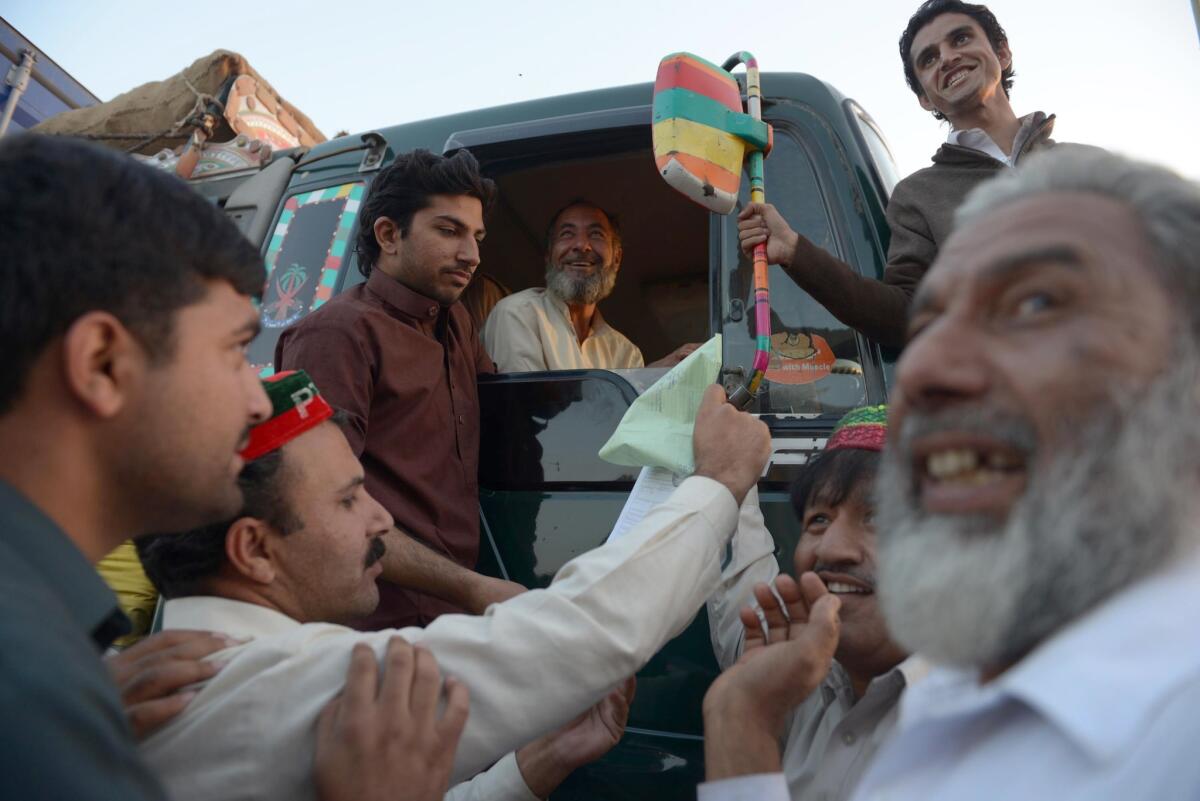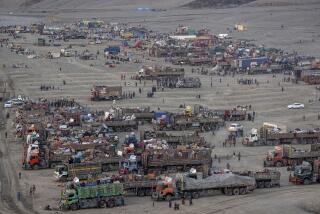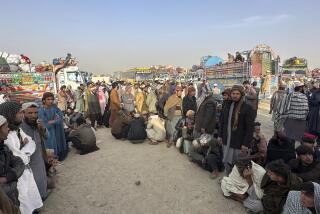U.S. halts truck shipments through Pakistan amid anti-drone protests

PESHAWAR, Pakistan -- Demonstrators at a protest camp cheered and chanted Wednesday as word spread that the Pentagon was suspending all truck shipments to and from Afghanistan through Pakistan following the activists’ weeklong efforts to disrupt the trade.
“Our workers protest has forced the U.S. to stop shipment of goods through Pakistan,” Khalid Masood, provincial general secretary of the Tehreek-e-Insaf party that has led the campaign, said as he sat at the camp set up at a toll plaza on the main highway in Peshawar.
The activists over the past week have stopped big rigs bearing shipping containers, demanding that drivers show them customs documents to ensure the shipments aren’t linked to the North Atlantic Treaty Organization.
Party workers have seized on the shipments as a way to protest the U.S drone program, which is highly controversial in Pakistan. Many see it as a violation of sovereignty and a means of attack that kills unacceptable numbers of civilians. U.S. officials say relatively few civilians are killed, and that the program is an effective way to counter terrorism -- even as American forces have reduced the number of strikes in recent years.
The Pentagon’s announcement Tuesday will only embolden the demonstrators to continue their protests, Masood said, and they’ll last until the U.S. stops all drone strikes in Pakistan.
Protesters, mostly political workers from the Tehreek-e-Insaf party and the radical Islamist Jamaat-e-Islami party -- both part of the ruling coalition in the restive northwestern Khyber Pakhtunkhwa province -- chanted gleefully: “God is Great. We won’t stop till the drone strikes end.”
Masood claimed that not a single container transporting NATO supplies for the war in Afghanistan has passed through Khyber Pakhtunkhwa on its way to or from the Torkham Gate border crossing since workers started their protest movement a little over a week ago. In all, 14 containers carrying NATO supplies were stopped and turned back, he added.
Further afield, however, there was less glee and more concern. Some analysts said it was rather simplistic on the part of the local party workers to draw a connection between the NATO shipments and the drone strikes.
Between November 2011 and July 2012, when Pakistan blocked all trucks laden with NATO shipments, there were still about 70 drone strikes, analysts said. The blockade was put in place after 24 Pakistani troops were accidentally killed near the border by a U.S. helicopter strike. The U.S. eventually apologized.
Shafqat Kakakhel, an analyst and former Pakistani ambassador to Kenya, Uganda and Ethiopia, said this latest blockade was a blow to Pakistan’s international standing.
“Diplomacy and external affairs are devolving to the provincial level,” he said. “This problem should be handled in parliament rather than trying to solve it on the roads.”
Pakistan is bound to help the U.S.-led NATO effort under United Nations Security Council resolutions, he added.
“This isn’t good news for Pakistan at any level,” Kakakhel said. “It is serious cause for concern for Pakistan, as it may lead to regional and international isolation, which Pakistan can’t afford.”
Highways fall under the supervision of the central government. However, despite signing a deal with the U.S. in July 2012 allowing NATO convoys to pass through Pakistan until the end of 2015, Islamabad has made little apparent effort to intervene in the blockade or rein in the demonstrators.
Some analysts wondered why the U.S. took such a decisive step, given that Pakistan’s other major land border with Afghanistan, located in southwestern Baluchistan province, was still operating unhindered.
In its announcement, the U.S. justified its decision by saying the protests were a potential risk to drivers and contractors. The U.S. reportedly ships about 33,000 tons of cargo out of Afghanistan each month, about half of which moves through Pakistan. The rest is shipped by air or through other Central Asian countries.
With this announcement, some analysts said, the U.S. may be showing that it is less dependent on Pakistan than it used to be.
“I think it is more to tell [Pakistani critics] that NATO supplies can’t be used to push them around,” said Mohammed Mehdi, a Lahore-based expert on foreign affairs and official of the ruling Pakistan Muslim League-N. “Ground realities have changed.”
A U.S. official in land-locked Afghanistan said NATO’s other options include moving cargo by air or through other Central Asian countries. However, either would add significant time and cost -- up to six times as expensive, by some estimates -- should the standoff drag on.
Foreign combat troops are scheduled to leave Afghanistan by the end of 2014. Analysts said the Americans may have decided they’d rather destroy or abandon hardware in Afghanistan rather than ship it out at great expense, giving them more flexibility.
“Americans no longer need the Pakistani route the way they once did,” said Mahmood Shah, an analyst and former brigadier general in the Pakistani army. “That’s why the Pentagon announced its decision.”
ALSO:
Family releases letter from U.S. man imprisoned in Cuba
Biden arrives in China amid tensions over air defense zone
Nelson Mandela not well but still teaching lessons, his family says
Twitter: @MarkMagnier
Special correspondents Ali reported from Peshawar and Sahi from Islamabad. Staff writer Magnier reported from New Delhi.
More to Read
Start your day right
Sign up for Essential California for news, features and recommendations from the L.A. Times and beyond in your inbox six days a week.
You may occasionally receive promotional content from the Los Angeles Times.






